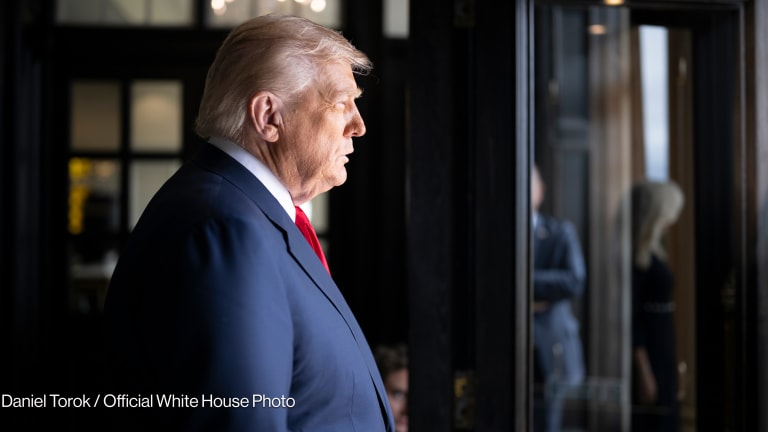
It was a defeat for aid groups in their legal battle against the Trump administration over its refusal to pay out foreign assistance funds, but the fight is far from over.
Also in today’s edition: A development darling comes back down to earth.
Upcoming event: On Wednesday, Aug. 20, at 9:30 a.m. ET, we’ll host a Devex Pro Funding conversation to explore lessons from the first billion-dollar trust-based philanthropy initiative, the Ford Foundation’s BUILD initiative, with its director Victoria Dunning, Register now.
The latest legal twist
A group of nonprofits and for-profit contractors had sued U.S. President Donald Trump’s administration for withholding foreign assistance funds that Congress had already approved. They made tentative progress in recouping money for work already done, but yesterday they experienced a major setback when a U.S. Federal Court of Appeals ruled they didn’t have the legal standing to challenge Trump’s refusal to spend federal dollars set aside by Congress for fiscal year 2024, which ends Sept. 30.
The plaintiffs argued that the White House was disregarding constitutional separation of powers and violating what’s known as the Impoundment Control Act, which restricts the executive branch’s ability to withhold spending funds allocated by the legislative branch.
But in a 2-1 decision, the majority-Republican-appointed court found that only the U.S. comptroller general, the head of the nonpartisan Government Accountability Office, can bring such a case to court.
It’s not the last word, however.
For one thing, the ruling didn’t address the core issue at stake: whether a president can override Congress’ constitutional power of the purse.
For another thing, the plaintiffs will now appeal to the full, 15-judge District of Columbia Circuit Court. Ultimately, the case will almost certainly wind up before the Supreme Court, which will have the final say over the checks and balances between the president and Congress — and who controls government spending.
Read: US appeals court backs Trump in fight over foreign aid freeze
ICYMI: What's the status of all the lawsuits against Trump's aid freeze?
+ Explore our regularly updated court tracker to catch up on the latest on the USAID docket.
Disappointing fall
A year ago, hopes were high that the ouster of longtime Prime Minister Sheikh Hasina of Bangladesh would usher in greater democracy and human rights for the country of over 170 million. A year later, hopes have dimmed, especially among NGOs and development advocates.
Bangladesh was actually regarded as a development darling under Hasina, given its impressive gains in poverty reduction, but some of those gains might’ve been illusory, with experts suggesting many economic figures were “cooked up.”
Meanwhile, corruption remains rampant and the country’s financial woes, coupled with its low tax revenue, mean it spends less on development priorities such as health and education, Catherine Davison writes for Devex.
Compounding the frustration is the fact that the interim government — led by Nobel laureate Muhammad Yunus and joined by NGO leaders and human rights campaigners who had been personally targeted under the previous regime — was expected to be a boon for the development sector.
During Hasina’s 15-year rule, human rights activists and civil society leaders faced violent crackdowns while NGOs struggled with restrictions and scrutiny, including arbitrary deregistration and the withholding of funds.
But today, reforms appear to be languishing. Despite establishing 11 reform commissions in areas such as the judiciary and women’s rights, few of the resulting recommendations have been adopted. Moreover, political unrest and mob violence have increased, and women’s and minority rights groups have faced growing backlash from an emboldened religious right, according to a statement by Human Rights Watch.
“The hope of the thousands who braved lethal violence a year ago when they opposed Sheikh Hasina’s abusive rule to build a rights-respecting democracy remains unfulfilled,” says Meenakshi Ganguly of HRW.
But others point out that change takes time — and patience.
“It's a tall order for the interim government,” says Iftekharuzzaman, executive director of Transparency International Bangladesh. “They're well-intentioned people, good-intentioned people. But they are presiding over a system which is really dysfunctional.”
Read: Why a repressive regime's fall hasn't helped NGOs in Bangladesh
Background: The rise and fall (and rise?) of Bangladesh as a development darling
Reflections post-Sevilla
Like so many well-intentioned global gatherings, this summer’s Fourth International Conference on Financing for Development, or FfD4, in Sevilla, Spain, ended with a long to-do list and a restrained sense of optimism. It’s usually only after the speeches stop and people head home that the pessimism begins to sink in.
But FfD4 did produce promising outcomes — and cautious hope that those outcomes will be fully realized, according to experts who spoke at a recent Devex Pro briefing moderated by my colleague Jesse Chase-Lubitz.
One clear outcome is that debt has moved from the periphery to the center of the conversation, said Mahmoud Mohieldin, the U.N. special envoy on financing the 2030 Agenda. “Before Sevilla, the debt crisis was a silent one. Now I think nobody can say it's silent,” he said.
A shift from depending on traditional Western donors was another outcome — an inevitable one, many said, given that those donors are shying away from official development assistance, or ODA.
“There was a turn — a pivot at Sevilla — towards more self-reliance,” said Eric Pelofsky of The Rockefeller Foundation. “I think with the impending collapse of ODA, or at least a contagion of ODA cuts, aspiration becomes necessity. It's all well and good to want to change models. But when the economic situation changes so dramatically, necessity drives change.”
Read: What to expect from the next decade of development finance (Pro)
+ A Devex Pro membership offers deeper analysis of the evolving development sector, exclusive events and timely conversations with sector leaders on issues facing the aid world, access to the world’s largest global development job board for career resources, and more. Try it out today by signing up for a 15-day free trial.
Savings over substance
Celebrations are muted as the United Nations turns 80 this year. Rather, the creaky institution is facing an existential crisis.
“In its lifetime, the U.N. has been and remains to be a crucial lifeline for millions around the world suffering human rights violations, persecution, conflict, and more. But instead of commemorating its legacy, this 20th-century institution has been buckling under the weight of 21st-century challenges and contemplating dramatic reform,” write Natalie Samarasinghe of the Public Engagement Platform for climate action and Savita Pawnday of the Global Centre for the Responsibility to Protect in a Devex opinion piece.
Those reforms, they argue, need to “intentionally embed human rights and atrocity prevention across every dimension of its work.”
But so far, Secretary-General António Guterres’ UN80 Initiative — billed as a comprehensive reform effort — reflects “a rushed, cost-cutting exercise rather than a values-driven renewal,” the authors contend, outlining ways that the world body can keep its promise “to save succeeding generations from the scourge of war.”
“Time and again, those living through atrocities have made clear that despite its shortcomings, the U.N. remains an invaluable avenue for progress when domestic systems fail — sometimes the only one.”
Opinion: At 80, the UN must hold the line on protection
Clinton switches it up
Former U.S. President Bill Clinton has announced big changes for this year’s Clinton Global Initiative annual meeting, a gathering that for decades has taken place alongside the United Nations General Assembly, or UNGA, in late September.
“Given the scope of the challenges we face, this year’s CGI meeting will be different — by necessity,” Clinton wrote in a recent statement. “We need to redefine how we show up, how we work, and how we find ways to honor our common humanity.”
To do that, Clinton said CGI — which takes place on Sept. 24 and 25 in New York City — will “connect dots across issues, expose the consequences, and confront the complicated issues in front of us.” That means the meeting itself will be “re-imagined,” CGI added, with a focus on convening new working groups to draft project plans, accelerate commitments, and create coalitions for further progress.
Those working groups revolve around eight different thematic areas, including climate, democracy, humanitarian response, and education, and aim to bring leaders and organizations in “action-focused sessions.” With the loss of USAID — the agency that once was the world’s largest donor — nearly everything about UNGA will be different this year. But in his statement, Clinton spoke of this as a moment among many: from the COVID-19 pandemic to the economic downturn in 2008 and 2009.
“Now is the time to stand up and roll up our sleeves — and do our part to reverse the trend lines and begin charting a brighter future,” he wrote.
In other news
The U.K. government is reconsidering its pledge — reaffirmed earlier this year — to ensure that 80% of its bilateral foreign aid goes to gender equality-related projects by 2030, raising concerns that abandoning this commitment could exacerbate setbacks in women’s and girls’ health, education, and rights in low-income countries. [The Guardian]
A joint letter signed by more than 100 aid organizations calls on Israel to stop its “weaponisation of aid,” claiming they were unable to deliver aid in Gaza due to new registration regulations. [Norwegian Refugee Council]
Failure to tackle the root causes of Sudan’s worst cholera outbreak in years could fuel further outbreaks across the region, as conflict displaces communities and the rainy season continues. [New York Times]
Sign up to Newswire for an inside look at the biggest stories in global development.








